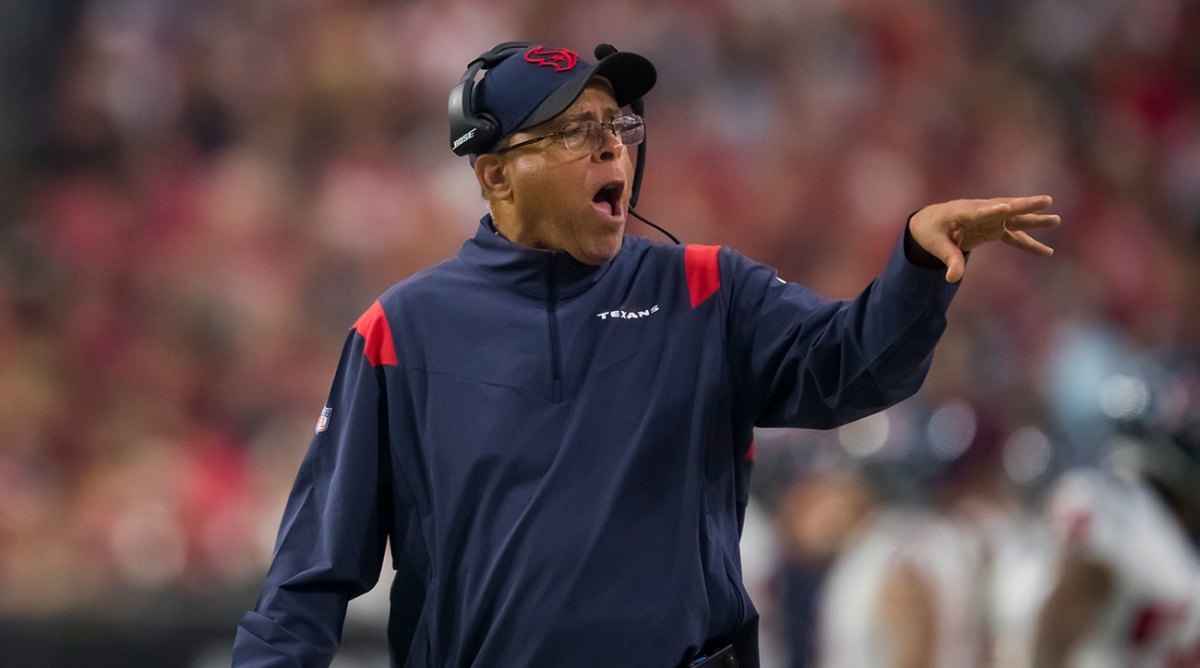Texans Fire David Culley, Who Did Everything He Was Asked

The Texans fired David Culley on Thursday, ending what may have been one of the most eyebrow-raising, start-to-finish charades in recent NFL history. Culley, the 66-year-old longtime assistant, was brought down to Houston and tasked with coaching one of the worst rosters from top to bottom in modern times, did it better than anyone expected and lost his job after taking the AFC’s No. 1 seed to the brink in the season finale.
The entire setup was designed to fail. Houston was designed to sell off not only its troubled quarterback, but a slew of role-playing veterans. The Texans were designed to sink and, eventually, recoup some of the draft equity Culley’s predecessors burned through. What they did not seem to anticipate was a coach to come in and win as many games as the far more talented Giants, finishing the season with nearly the same record as Matt Rhule and the Panthers.
If Culley was fired for doing a bad job, what is the standard for doing a good job in the NFL during a complete organizational rebuild, and what responsibility does anyone have in preventing or punishing a process that reeks of premeditation and further undermines the cause of Black head coaches everywhere? Coaching gossip throughout the year cynically linked the Texans with one former Patriots assistant or another in due time. It felt like maybe Houston had someone in mind, couldn’t get him and ended up installing a backup plan on the fly. ESPN reported in the wake of Culley’s firing that only two years of his contract were guaranteed, which is the standard length for most assistants and half the length of most head coaching contracts.
But in Culley, the Texans found someone who was going to make the most of an opportunity, no matter how backhanded the chance laid out in front of him was—someone who dutifully faced questions about Deshaun Watson on a daily basis, taking the public jabs for a scandal that predated his arrival and hovered over the entire season. The team dismantled the Chargers. It beat the Titans once and twice knocked out the division-rival Jaguars, who ended up solidifying themselves as the square-wheeled wagon the Texans were supposed to be.

Firing Culley after this kind of performance, winning games with Tyrod Taylor and third-round rookie Davis Mills, proves that cynical chatter correct. It continues an embarrassing trend of minority coaches in the NFL getting half the runway of their white counterparts, requiring gargantuan expectations to succeed in impossible scenarios. Two years for Vance Joseph in Denver with zero quarterback. One year in Arizona for Steve Wilks, with Josh Rosen under center. Jim Caldwell out in Detroit after a 9–7 season, only to watch a lengthy cavalcade of ineptitude parade through town after him.
Would the Texans have fired Josh McDaniels for going 4–13? Would they have offered another coach a two-year deal?
Perhaps Culley understood the buzzsaw into which he was walking. Signing a contract like that in the first place would lead us to believe as much. Maybe he’s been around the block enough to have seen the long road ahead, known the deal and decided to proceed anyway. If that’s the case, God bless him. But there is something unseemly about the examples both unknowingly set.
Maybe the Texans, after dozens of attempts, will be the first franchise to really, truly, actually create some kind of Patriots satellite camp (they’ve been heavily linked to recently fired Dolphins coach Brian Flores). Now that they’ve hired the GM and the character development coach, maybe we’ll also get the right Belichick assistant—and the right Belichick turf manager and the right Belichick pencil sharpener—and for the better part of two decades, Houston will win a pocket full of Super Bowls and become the anchor point of NFL power.
Or, maybe they’re just doing what other teams have unwittingly done for years: firing someone who was perfectly capable and good, who outperformed expectations significantly, for the promise of something better. Undermining the already strained efforts of Black coaches in the NFL, because that’s what the management playbook says you can do. Treating good work from a good man like gravel under your tires.
If and when the Texans finally begin to put in permission slips for interviews, coaches should deny them forcefully, unless, of course, you know you’ve already been preordained as The Choice. So much of the process, like Culley’s contract, was just for show.
• Postseason MMQB Power Rankings Poll
• MMQB Season Awards: MVP, Rookies, More
• Matt Nagy Couldn't Recapture His First-Year Magic
• Mike Zimmer and the Vikings' Era of What Could Have Been
